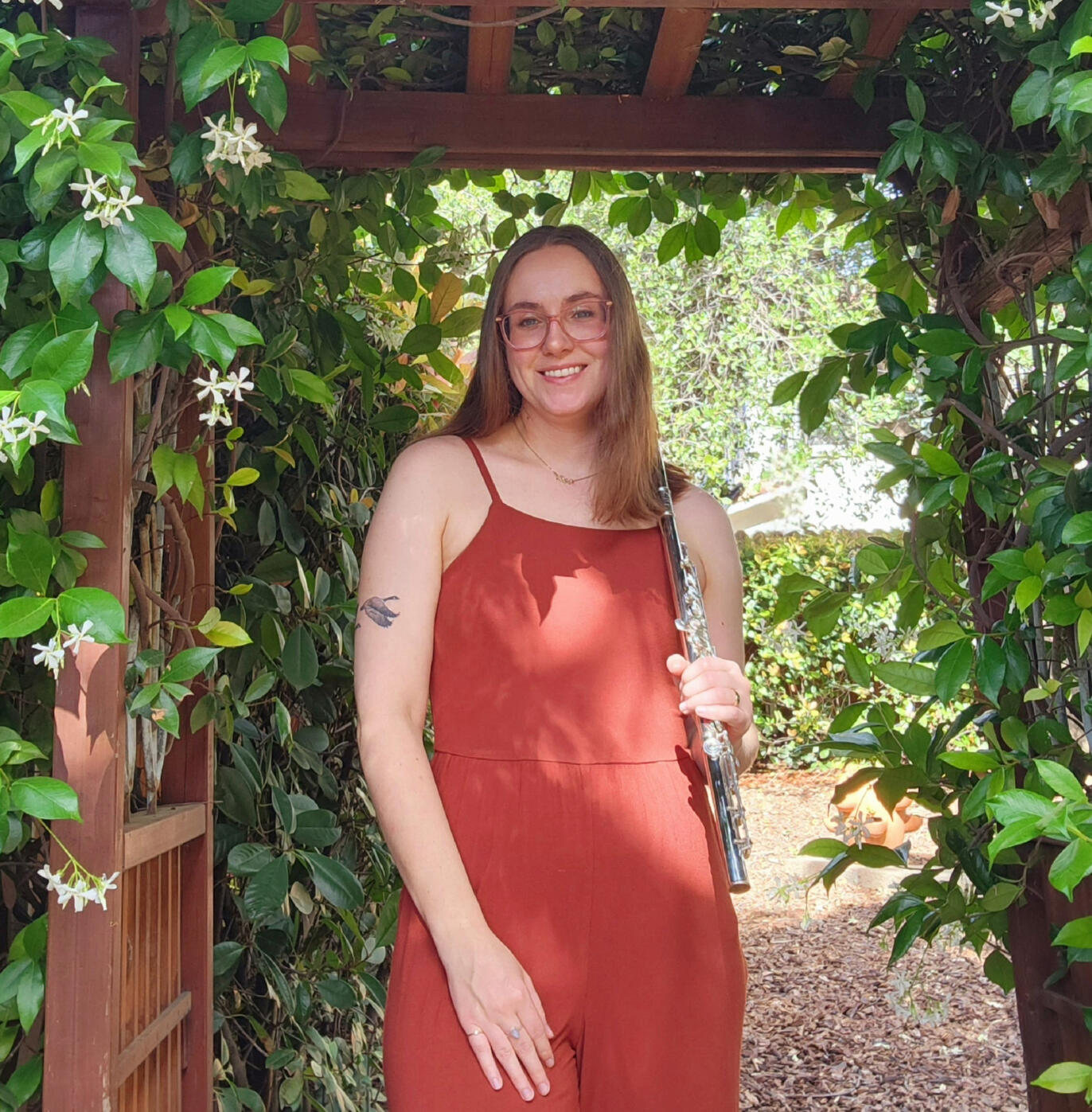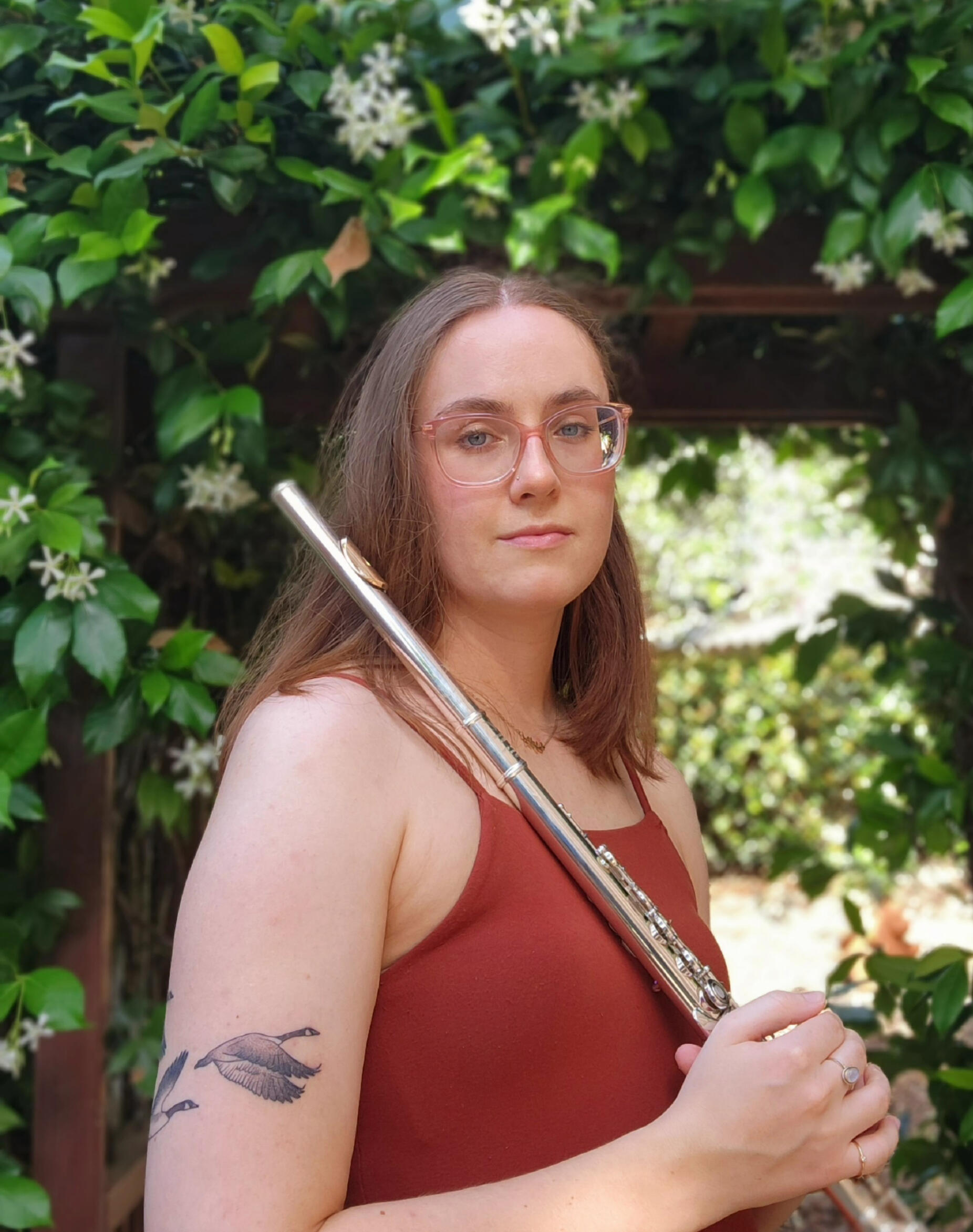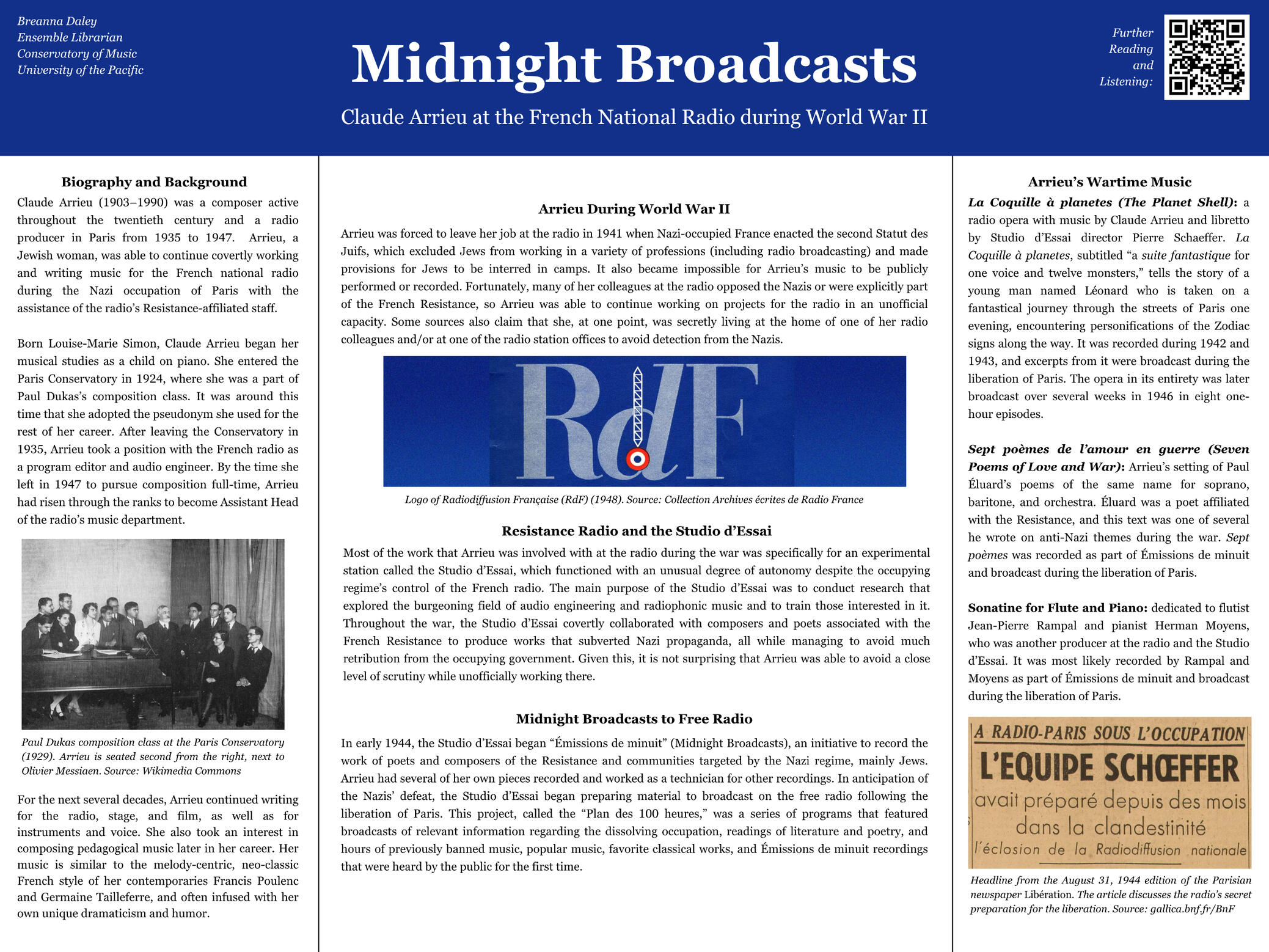Breanna Daley

Hello and welcome! If you are interested in taking lessons with me, please go to my lessons page for more information. To get in touch with me regarding performances, recording, collaborations, and more, please see my contact page.
Bio
Breanna Daley leads a diverse career as a flutist and music performance librarian. She is currently the Ensemble Librarian for the Conservatory of Music at University of the Pacific in Stockton, California, where she manages the library work for the Conservatory's ensembles and edits the concert programs. She has previously worked in other areas of the library and archival fields, including positions at University of Northern Iowa (UNI) Rod Library's Fine and Performing Arts Center and the UNI Musuem's Center for Rural Schools.Alongside her career in librarianship, Breanna is active as a flutist. She maintains a private studio in the Sacramento area, and previously taught in the woodwind and music history areas at the UNI School of Music and was a flute instructor with the UNI Community Music School. She frequently performs with a variety of orchestras, wind bands, and chamber ensembles in the Sacramento area and serves on the board for the Sacramento Flute Club. As a musicologist, Breanna's research often focuses on women composers, flute music, and radiophonic music in World War II France, specifically composer Claude Arrieu. She also enjoys making her own arrangements of music for flute chamber ensembles.Originally from California, Breanna holds a BM in flute performance from Washington State University, and MMs in flute performance and music history from University of Northern Iowa. Her primary teachers are Sophia Tegart and Hannah Porter Occeña. When she's not practicing or organizing shelves of sheet music, Breanna loves reading fantasy novels, hiking, and hanging out with her two cats.

Take Lessons With Me

Welcome to my flute studio! My goal as a teacher is to provide students with a positive environment to be creative, challenge themselves, and have fun. I believe that every person can benefit from training in music, and I will do my best to help the student work towards what they are looking for in flute lessons. I aim to give students the resources to become independent, focused learners and confident, well-rounded musicians.I teach students of all ages and skill levels, and my studio is a safe space for everyone regardless of sexual orientation, race, religion, and gender identity. As someone who is neurodivergent and deals with chronic conditions, I strive for my lessons to be accessible to anyone. I am always open and willing to accommodate students with differences/disabilities.
What We Do in Lessons
Lessons with me are always tailored towards each individual student, but there are fundamental aspects of my teaching I prioritize with everyone. These are just a few examples of what we may do in lessons.
Work on the fundamentals - notes, rhythm, intonation, dynamics, breath control
Learn effective practice strategies
Develop and hone musicality and expression
Learn correct posture and movement when playing
Discuss the historical and cultural significance of the music
Learn to interpret music based upon the time period and style
Work on managing performance anxiety
Prepare for auditions (All-State, Honor Band, collegiate), competitions, recitals, concerts, and more
Get Started
If you are interested in taking lessons, fill out the interest form below with your contact information.
Once I receive your response, I will reach out to set up a lesson time if there is availability in my studio.
Listen
Sonatine by Claude Arrieu
with Jun Lee, piano
Itinerant by Toru Takemitsu
Sonata "Undine" IV. Finale by Carl Reinecke
with Dr. Robin Guy, piano
More videos can be found on my instagram and youtube below!
Research
"The Flute Music of Claude Arrieu: Jean-Pierre Rampal, Radio, and the French Flute School."
Master's Thesis, 2024
Abstract: The flute works of Claude Arrieu (1903–1990) are relatively unknown, as is Arrieu herself. A composer active throughout the twentieth century and a radio producer in Paris during the 1930s and 1940s, Arrieu and her music are now often lost amongst the more popular works of her French contemporaries. Her compositional output, which includes music written for traditional concerts and over seventy scores for radio and film, displays her ease in navigating the early twentieth century’s changing mediums of music performance. Arrieu composed several pieces for solo flute with piano or orchestra, including the Sonatine for Flute and Piano (1943) and the Concerto in G for Flute and Orchestra (1946). These works were dedicated to the famous flutist Jean-Pierre Rampal (1922–2000) and performed by him on the radio during and immediately after World War II. I will present a study on Arrieu’s Sonatine and Concerto, examining the pieces’ connection to the French flute school, the radio, and Rampal, whose career as a soloist was defined by radio and recorded performances. I will examine how the Sonatine and the Concerto synthesize influences from contemporary French style, Classical form, and radio music, and discuss how Arrieu’s flute writing complements and may even have been informed by Rampal and the French flute school. With this thesis, I hope to provide a comprehensive guide on the Sonatine and the Concerto that will facilitate future performances and research, and expand upon the small body of scholarship that exists on the music of Claude Arrieu.
"Midnight Broadcasts: Claude Arrieu at the French National Radio during World War II."
Poster Presentation, University of the Pacific Admitted Students' Day, 2025
Abstract: Claude Arrieu (1903–1990) was a composer active throughout the twentieth century and a radio producer in Paris from 1935 to 1947. Her compositional output, which includes music written for traditional concerts and over seventy scores for radio and film, displays her ease in navigating the early twentieth century’s changing mediums of music performance. Arrieu, a Jewish woman, was able to continue covertly working and writing music for the French national radio during the Nazi occupation of Paris with the assistance of the radio’s Resistance-affiliated staff. During this time, she composed the music for the radio opera La Coquille à planetes, and the radio made secret recordings of some of her other pieces, including the Sonatine for Flute and Piano and the song cycle Sept poèmes de l’amour en guerre. These secret recordings, which were made as part of the radio’s project called Émissions de minuit (Midnight Broadcasts), were among the many pieces of previously banned music that were later broadcast on the free radio immediately following the liberation of Paris. This project will cover Arrieu’s work at the radio during World War II, and how the Resistance-affiliated radio staff enabled her to continue writing music under an oppressive regime.

"Medieval Chant Manuscripts from Women’s Communities in University of Iowa Libraries: Collaborative Musicological Research and Digital Scholarship."
Joint Presentation, University of Iowa Musicology Colloquium, 2023.
Abstract: In spring 2023, students in Dr. Alison Altstatt’s Music History topics class Chant from Manuscript: History, Theory, Scholarship, Practice at the University of Northern Iowa indexed and transcribed an early sixteenth-century chant manuscript (xMMs P01) containing the Office of the Dead and other end-of-life liturgies. The manuscript, recently acquired by the University of Iowa Library Special Collections, is believed to be from the French royal convent of Saint Louis de Poissy. The presentation featured an analysis of the manuscript and performances of the chant from the source material.
Master's Flute Recital Document
2022
Abstract: A musical and historical analysis of Itinerant by Toru Takemitsu, Concerto in D major, K. 314 by Wolfgang Amadeus Mozart, Sonata “Undine” for Flute and Piano by Carl Reinecke, and Le Moment du Cristal by Yuko Uebayashi.